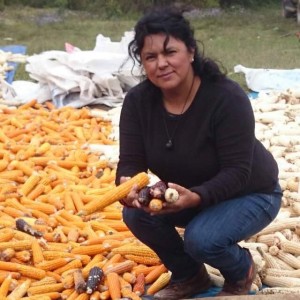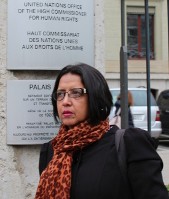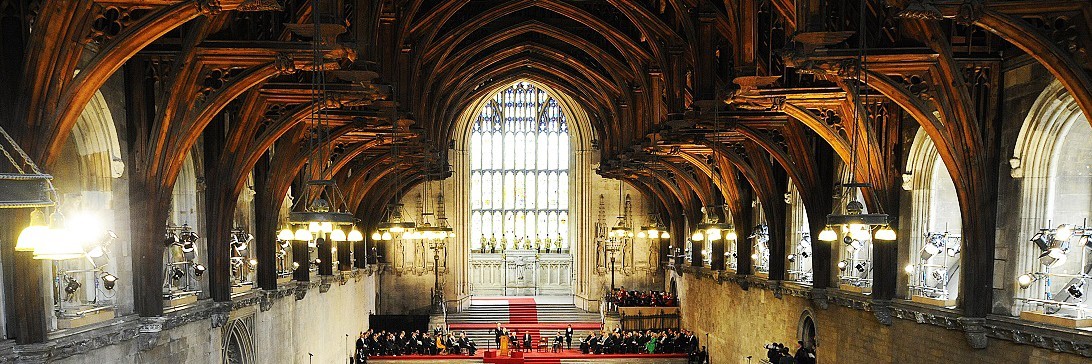“Women human rights defenders are at the forefront of the fight for human rights around the world, yet they continue to face some of the worst attacks; both because they are women and for their work defending human rights in their countries. On International Women’s Day 2016, it is vital that the international community recognises and champions the work of WHRDs, and helps to build an environment where they are able to defend human rights without risk.” Ann Clwyd MP (PHRG Chair)
Today, Tuesday, 8 March, is International Women’s Day and the All-Party Parliamentary Human Rights Group (PHRG) is marking the day by paying tribute to women human rights defenders (WHRDs) around the world.
WHRDs often carry out their work under considerable pressure from governments, big business and their own communities, and are most at risk when working in areas of conflict or widespread violence.
WHRDs are exposed to the same types of risks as all other defenders but also face greater risks and criminalisation based on their gender. In particular, they face a heightened risk of sexual harassment, violence and rape. The reasons for this are complex but hostility can arise when the work of WHRDs is seen to challenge traditional societal family and gender roles. Attacks against them are perpetrated by both state and non-state actors, and many of these attacks are treated with total impunity.
 The serious and systemic violence against WHRDs around the world was brought to the world’s attention just last week, when prominent WHRD Berta Cáceres was murdered in Honduras. Berta was founder and general co-ordinator of Concejo Civico de Organizaciones Populares Indigenas de Honduras (COPINH), was murdered in her home town of La Esperanza, Intibuca. She dedicated her life to the struggle in defence of the rights of the indigenous peoples, particularly their lands and natural resources. In 2015 she won the Goldman Prize for her work and unflagging leadership. We are calling for a full and impartial investigation and justice for her murder. The Honduran Government must also do more to protect human rights defenders in that country.
The serious and systemic violence against WHRDs around the world was brought to the world’s attention just last week, when prominent WHRD Berta Cáceres was murdered in Honduras. Berta was founder and general co-ordinator of Concejo Civico de Organizaciones Populares Indigenas de Honduras (COPINH), was murdered in her home town of La Esperanza, Intibuca. She dedicated her life to the struggle in defence of the rights of the indigenous peoples, particularly their lands and natural resources. In 2015 she won the Goldman Prize for her work and unflagging leadership. We are calling for a full and impartial investigation and justice for her murder. The Honduran Government must also do more to protect human rights defenders in that country.
This International Women’s Day, we call upon the UK Government to work with their international counterparts to:
- Condemn attacks made against WHRDs;
- Develop or strengthen legal frameworks and national protection mechanisms so WHRDs are better protected and can obtain justice;
- Enact laws that support space for civil society and remove excessively rigorous requirements for the registration of NGOs or for accessing international funding;
- Target funding to WHRDs and their organisations around the world.
WHRDs at risk
Peace Brigades International (PBI) is an international NGO which provides protection, support and recognition to local human rights defenders who work in areas of repression and conflict. PBI works to protect many WHRDs, including the following:
- Claudia Julieta Duque: Correspondent for the Colombian human rights Internet radio station Radio Nizkor and a former researcher for the José Alvear Restrepo Lawyers’ Collective (CCAJAR). She has investigated and reported on issues including forced disappearance and forced recruitment of children by legal and illegal armed actors. In Colombia, there has been an increase in attacks on WHRDs recently; between January and September 2015, 249 women defenders were attacked, a sharp rise from 221 attacks in 2014 and 85 in 2013. This video about WHRDs in Colombia highlights the harassment, threats and attacks that they face.
- Sara Mendez: Human rights’ lawyer in Oaxaca, Mexico, protecting a large, marginalised, indigenous community defending their territory against large-scale commercial projects. PBI has helped to protect Sara since 2011, so she can continue her brave fight for justice and the rights of others.
- Doña Brígida: Member of the Peace Community of San José de Apartadó in North-West Colombia. This community has faced violent threats, stigmatisation, assassinations and massacres because of its choice to declare itself neutral and its refusal to leave its land in the midst of a civil war. PBI has provided life-saving support to the Peace Community since 1997. Read more about the community here.
The Centre for Applied Human Rights at York University also hosts WHRDs as part of its Masters programme. See profiles of this year’s defenders here.
The PHRG and WHRDs
The PHRG continues to work to raise the profile of WHRDs at risk in the UK Parliament. During the past year, we have met with many WHRDs, some of whom are profiled below.
 Dina Meza: President of PEN Honduras and also one of Reporters Without Borders’ “100 Heroes and Heroines of Information” in 2014. When she met with the PHRG, she highlighted the extremely dangerous environment for journalists and human rights defenders in Honduras. She has faced intimidation as a result of her work. See more here.
Dina Meza: President of PEN Honduras and also one of Reporters Without Borders’ “100 Heroes and Heroines of Information” in 2014. When she met with the PHRG, she highlighted the extremely dangerous environment for journalists and human rights defenders in Honduras. She has faced intimidation as a result of her work. See more here.
 Esperanza Salazar: Coordinator of Bios Iguana, a Mexican environmental protection NGO. She has been working to highlight the impact of mining on communities and the natural environment in Colima, Mexico. When we met with her, she highlighted the lack of consultation and use of force against indigenous communities who opposed mining projects. Esperanza has been forced to leave her community, as a result of her work. More on the meeting here.
Esperanza Salazar: Coordinator of Bios Iguana, a Mexican environmental protection NGO. She has been working to highlight the impact of mining on communities and the natural environment in Colima, Mexico. When we met with her, she highlighted the lack of consultation and use of force against indigenous communities who opposed mining projects. Esperanza has been forced to leave her community, as a result of her work. More on the meeting here.
 Jane Lingbawan Yap-eo: Executive Director of the Center for Development Programs in the Cordillera, Philippines. She raised with the PHRG the impact of mining on indigenous rights to land. Jane has been personally threatened by the military, by phone and text message, for her work defending indigenous people’s rights against mining. Read more here.
Jane Lingbawan Yap-eo: Executive Director of the Center for Development Programs in the Cordillera, Philippines. She raised with the PHRG the impact of mining on indigenous rights to land. Jane has been personally threatened by the military, by phone and text message, for her work defending indigenous people’s rights against mining. Read more here.
 Rosa Iris Diendomi: Dominican of Haitian descent who is a lawyer and member of the social movement Reconoci.do. Rosa met with us to raise awareness about statelessness and her experience of discrimination in the Dominican Republic. Read more about the meeting here.
Rosa Iris Diendomi: Dominican of Haitian descent who is a lawyer and member of the social movement Reconoci.do. Rosa met with us to raise awareness about statelessness and her experience of discrimination in the Dominican Republic. Read more about the meeting here.
 Shabnam Hashmi: Human rights defender with more than 30 years’ experience working at the grassroots on issues related to communalism, democracy, minority rights and other issues in India. When we met with Shabnam, she raised concerns about rising Hindu nationalism in the country and restrictions on NGOs and freedom of speech. Read more here.
Shabnam Hashmi: Human rights defender with more than 30 years’ experience working at the grassroots on issues related to communalism, democracy, minority rights and other issues in India. When we met with Shabnam, she raised concerns about rising Hindu nationalism in the country and restrictions on NGOs and freedom of speech. Read more here.
 Mandira Sharma: Human rights defender from Nepal and chairperson of the Nepalese NGO Advocacy Forum. Mandira and her colleagues bring human rights victims’ cases to courts in Nepal and campaign for legal reform. When the PHRG met with Mandira last spring, she noted an increasing sense of vulnerability amongst human rights defenders in Nepal. Read more about the meeting here.
Mandira Sharma: Human rights defender from Nepal and chairperson of the Nepalese NGO Advocacy Forum. Mandira and her colleagues bring human rights victims’ cases to courts in Nepal and campaign for legal reform. When the PHRG met with Mandira last spring, she noted an increasing sense of vulnerability amongst human rights defenders in Nepal. Read more about the meeting here.

